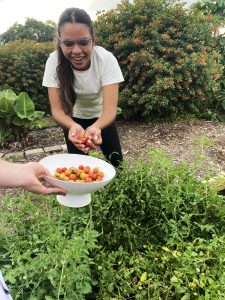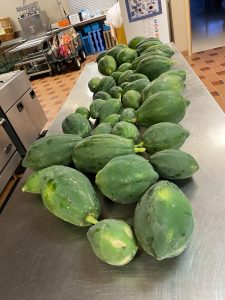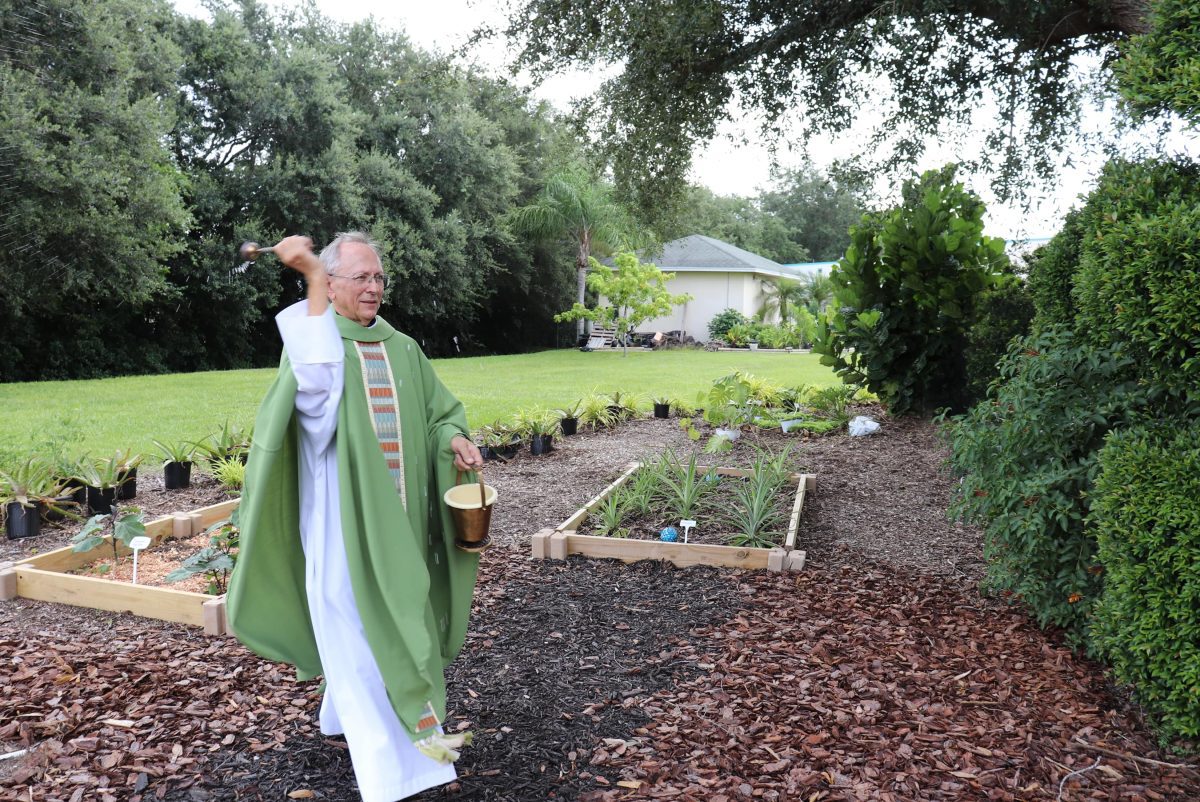WINTER HAVEN | What started as the desire for a peaceful place for parishioners to pray at St. Matthew Parish, Winter Haven, is now a certified St. Kateri Habitat, bearing fruit, vegetables, and flourishing with native plants, butterflies, bees, and birds.
Two years ago, parish business operations manager Susan Simonson and groundskeeper Bill Ball had an idea. They wanted to convert a large vacant space in front of the parish property into a quiet haven for parishioners. But the task was weighty and required more work than anticipated. Enter Claudia Tejada, new catechetical leader.
After being approached by parents about a summer program for youth, she sat in her office praying for guidance. She looked out her window and saw the Holy Spirit’s response, the genesis of a garden. She spoke to Simonson, who explained it was a work in process. She wanted to get it certified through St. Kateri Habitat but didn’t have sufficient volunteers to do what was required.
St. Kateri Tekakwitha (1656–1680) is the patron saint of traditional ecology, Indigenous Peoples, and care for creation.

“St. Kateri Habitats are sanctuaries that go beyond providing essential resources for people and wildlife; they are living, sacred spaces that embody the harmonious coexistence of faith and ecological stewardship,” explains their website. “These habitats offer food, water, cover, and space for all beings, becoming places of prayer and contemplation that rejuvenate faith while preserving the spiritual and material gifts of creation.” For Simonson and Ball, it was a perfect complement to their parish.
Tejada suggested the youth group as permanent volunteers. Simonson loved the idea.
Immediately going to work, Tejada filled out the required documents online and gathered donations to purchase native plants and essentials to meet the requirements for certification. St. Kateri Habitats use no chemicals, incorporate native plants, as well as fruits and vegetables in their own bedded gardens so as not to mix with other native plants.
Tejada explained many of the youth knew little about where their food comes from. “For them to see from the beginning it starts with seeds, and how God created these beautiful seeds to become a tree, or flowers, or food — that is a part of the mission, to see nature. That is something they don’t usually experience,” she said. “They learned we have to get our hands dirty in order to produce something, to eat something.”
As excitement grew among the youth, so did their numbers. What started as 10 students became a thriving youth group of 45, helping the mission of the habitat become reality. They were learning about God’s creation, nature, the earth and Catholic social justice.

“They get so excited and actually ask to go into the garden,” Tejada said. They are invigorated by seeing the plants growing, and Tejada encourages them, requiring them to measure the plants and log progress. “To see the expressions on their face, to have the experience of growing a garden says a lot,” she added.
In the summer of 2024, the garden began to yield treasures starting with papayas. “They grew really quick. I was surprised,” Tejada recalled. Soon they grew watermelons and pumpkins and then donated some to the local Catholic Charities of Central Florida Agape Food Market. This year they also donated cherry tomatoes, eggplant, spinach, and radishes.
In October 2024, the parish received a $5,000 grant from the Women’s Philanthropic Giving Circle for the garden. The grant enabled the purchase of more seed, soil, mulch, garden tools, benches, a fountain and statue of St. Kateri. The garden was blessed by pastor, Father Nicholas O’Brien in June 2025.
The youth continue tilling and planting. For student Destiny G., “The garden is an extension of (the) church.” Diego R. is amazed at the transformation and is proud to continue playing a part in sustaining it.
“In the beginning of the garden, it was messy and unorganized. There were so many plants everywhere. I saw over time, the progress of the garden,” said Krysel P. “And now it’s just a beautiful place where we grow food and give it to people.”
For Tejada, a former teacher, the process has exceeded her hopes. “Having a place where kids come into a safe environment to experience and to learn about God – not just by reading, but by being able to touch and experience how things are made and grow compared to a school environment is a big difference,” she said. “I can see their expressions, their pride in knowing they did this.”
She compares the process of praying and believing to the slow growth of a plant. “They see how, if you pray for something, God will listen to you, but you must pay attention. And that’s how nature is. Things grow little by little and that’s how faith will grow in you when you start believing in God. He’s going to be there all the time, but it takes us time to listen to Him. When they see that, they realize God did this. That means He’s here with me. I can listen to Him. He’s real. It’s a big impact for them,” she said.
By Glenda Meekins of the Florida Catholic staff, October 22, 2025

